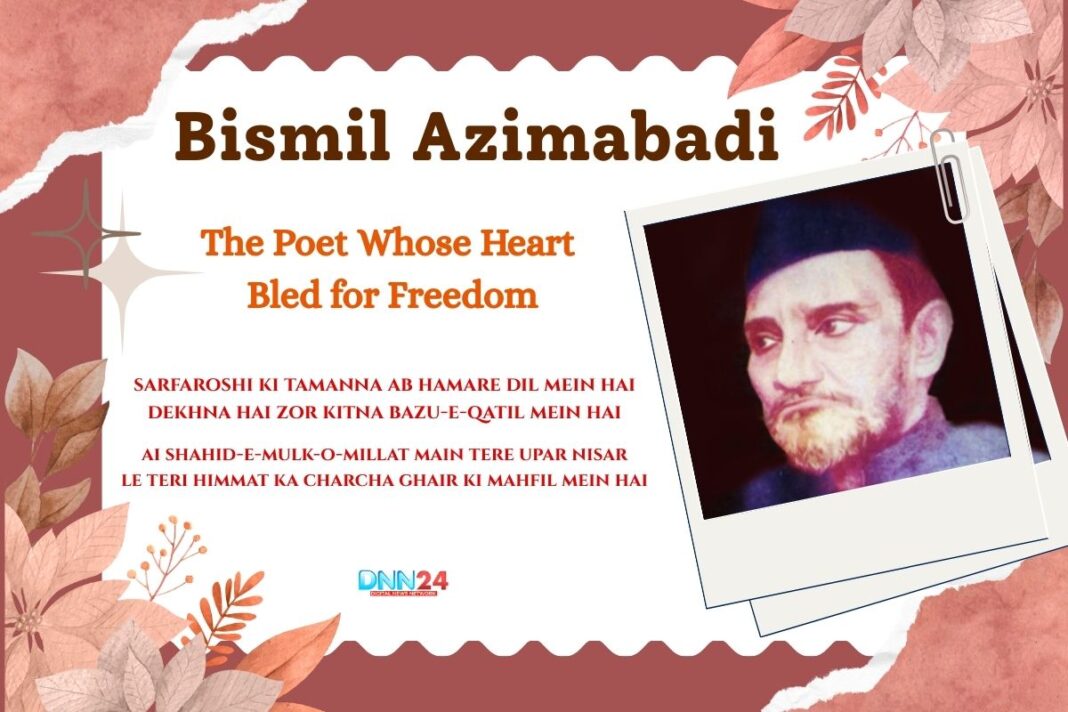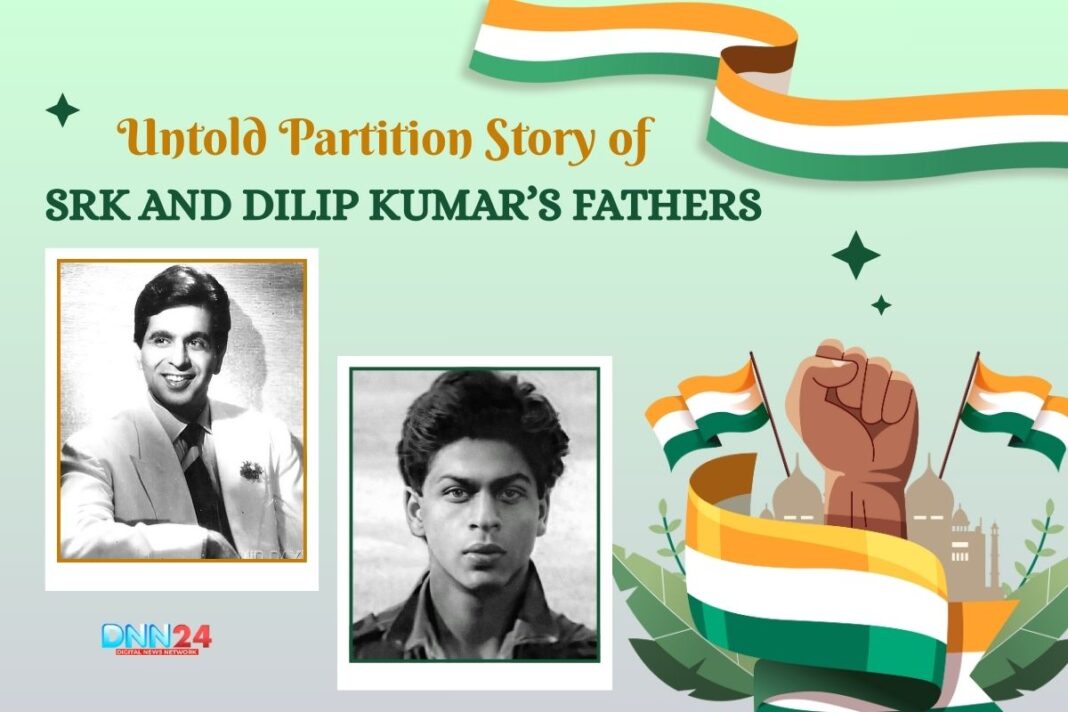When we refer to freedom fighters, we tend to visualise the image of soldiers and their rifles or even a group of revolutionaries planning some risky operation. But Bismil Azimabadi, born Syed Shah Mohammad Hasan in 1901, emerged from a world steeped in quiet scholarship, Sufi tradition, and poetic fervour. His childhood was spent in Azimabad, now Patna, where the scent of Urdu poetry drifted in the air.
tang aa gae hain kya karen is zindagi se hum
Bismil Azimabadi
ghabra ke puchhte hain akele mein ji se hum
The death of his father, a well-respected barrister, left little Bismil in the company of literary giants. These maternal family members were also poets themselves and the students of famous wordsmiths. This was not an easy life, though. Losses in early bereavement, the world-weariness he had inherited, the restless spirit, all these things led Bismil to find comfort not only in verse, but also in the ideals that were being established throughout India.
na apne zabt ko ruswa karo sata ke mujhe
Bismil Azimabadi
KHuda ke waste dekho na muskura ke mujhe
The tales of these years speak of a boy who crept between houses, haunted by a feeling of mission and desire–a desire which was to start a revolution in ink and feeling. It was during these early years that he took his pen name, Bismil, or the wounded one, in commemoration of his heart, which hurt in silence, but also of a fierce resolve to do something about a wrong.
ruKH pe gesu jo bikhar jaenge
Bismil Azimabadi
hum andhere mein kidhar jaenge
Fire and Verse: Creating an Anthem from Sorrow
The pain transformed into poetry of rebellion and hope, and Bismil wrote it in 1919 in the wake of the Jallianwala Bagh massacre. This was a heartbreak to so many, but it was a wake-up call to Bismil. In 1921, he composed Sarfaroshi Ki Tamanna, a nazm so strong that its verses would reverberate throughout the nation’s freedom movement.
ab dam-ba-KHud hain nabz ki raftar dekh kar
Bismil Azimabadi
tum hans rahe ho haalat-e-bimar dekh kar
This was not the usual ghazal but poetry on the march—soldiers of hope every line, battle cry every stanza. And a lad of fifteen, with his head bent over a couple of sheets of paper, he was writing the anthem that shook the world: Sarfaroshi ki tamanna ab hamare dil me hai. Not only imagination, but opposition.
ab dam-ba-KHud hain nabz ki raftar dekh kar
Bismil Azimabadi
tum hans rahe ho haalat-e-bimar dekh kar
The manuscript of the poem, which is still in the Khuda Bakhsh Oriental Library in Patna, has the corrections of the very literary mentor of Bismil himself, Shad Azimabadi. The amputations, even the lyrics, had been a conjugation of passion and wrath. It is a tale not much told: that of a young poet, writing poems that rock the world, and followed and tutored by older men who regarded him as the carrier of a torch to a blazing vision.
chaman ko lag gai kis ki nazar KHuda jaane
Bismil Azimabadi
chaman raha na rahe wo chaman ke afsane
The Unspoken Battles: Navigating Loss and Identity
Of silent struggle, there is a life behind each verse of movement. The path that Bismil took was full of misery- the death of his father, moving in and out of houses, and living under the shadow of the great poets, but yearning to make his mark. He was brought up during the period when revolutionary ideas were not only a myth but a tune in the halls of libraries and illegal meetings.
ab raha kya hai jo ab aae hain aane wale
Bismil Azimabadi
jaan par khel chuke jaan se jaane wale
In the archives, there are tales of Bismil visiting the Qutub-khana Anjuman Taraqqi Urdu Library, Patna, and learning the knowledge of his seniors and teachers. Not riches, but words, this was all that the lad who was deprived of his father had inherited.
ab raha kya hai jo ab aae hain aane wale
Bismil Azimabadi
jaan par khel chuke jaan se jaane wale
His poetry was flying as he grew up not without opposition, however, on the part of a society, not easily convinced of the possibility of reform, and of an English Raj, which regarded subversive writing as a form of sedition. Every poem is a revolution, every contact a risk to life and every book a battle to live. These struggles have some emotional strength: A poet, an orphan, finds in his pen what other men see in their swords.
jab kabhi nam-e-mohamad lab pe mere aae hai
Bismil Azimabadi
lab se lab milte hain jaise dil se dil mil jae hai
Bismil and his Thunder: The way of transforming a Loss into a Revolution in Literature
The heart of Bismil Azimabadi’s genius was not just in loving sorrow but in turning it—again and again—into revolutionary thunder. Influenced by Patna’s intellectual climate, Bismil’s mentors challenged him to go beyond rhyme. When he went to the Calcutta Congress Session in 1920, he was not merely a witness to history; he also recited poetry that would become its soundtrack.
sochne ka bhi nahin waqt mayassar mujh ko
Bismil Azimabadi
ek kashish hai jo liye phirti hai dar dar mujh ko
These moments have his real stories woven into them. We find in the diary, now housed in the Khuda Bakhsh Library, not only verses, but also lines crossed out, corrections inserted by hand–the work of the writer in his ceaseless endeavour to achieve significance and effect.
ab mulaqat kahan shishe se paimane se
Bismil Azimabadi
fatiha paDh ke chale aae hain mai-KHane se
Bismil was hurt, and his hurt became contagious, and passed the defiance and the hope on verses that went off library shelves and onto picket lines. Or did his verse seem a decoration? It was the march of revolt. What is special about this is that the literary and the political journeys of Bismil were intertwined, one sustaining the other, and both contributing to the legacy.
sari ummid rahi jati hai
Bismil Azimabadi
hae phir subh hui jati hai
Living Stories: The Human Face of Bismil Azimabadi
Very few know the everyday Bismil Azimabadi. Behind the poet, there was a man who got pleasure in collecting young dreamers and encouraging them to find their own voice. Deep down, he was an inspiration: guiding, correcting, and consoling those who sought his advice. Patna tales narrate how Bismil used to invite poets to recite their poems, edit with scrupulous care, and speak of freedom, not as an ideal but as a lifestyle.
meri dua ki ghair pe un ki nazar na ho
Bismil Azimabadi
wo hath uTha rahe hain ki yarab asar na ho
It has a story, hidden, of the day when he stood before Congress, and read his verse, and saw history made–and then went back quietly to the library, anxious to see the world in the margin of a book. Though his poems were rising to the heights of nationalism, his everyday life was a quilt of struggle, thought and laughter. It is not only the revolution that we all remember, but the warmth. The sentiments that came and came in every meeting were softness, hopefulness, and constant belief in the power of the word to rouse people to the soul.
nigah-e-qahr hogi ya mohabbat ki nazar hogi
Bismil Azimabadi
maza de jaegi dil se agar ai sim-bar hogi
Bismil Azimabadi’s story, in all its unheard beauty and raw power, teaches us that sometimes, history-makers are poets. Beautiful fight. The real fire comes not only out of the roar of revolution but also the scribble of hope in the corner of a library, the therapy of belonging, and the love that never dies of every wound.
KHizan jab tak chali jati nahin hai
Bismil Azimabadi
chaman walon ko nind aati nahin hai
Also Read: Talib Chakwali: A Life Woven in Words, Loss, and the Search for Meaning
You can connect with DNN24 on Facebook, Twitter, and Instagram and subscribe to our YouTube channel.



